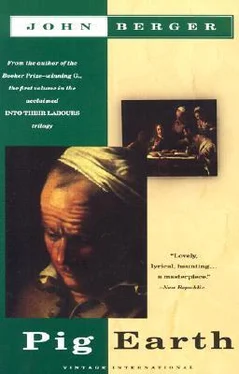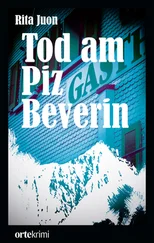If I didn’t have enough, she cried, I could go on for another ten years. I do have enough. I have scavenged for twenty years. I want to enjoy the rest of my life. I want to move back into the village. You have a house in the village and you haven’t much else. I’m prepared to buy now a share of your house until I’m dead, and I will pay you straight away. The rest of my savings I’m keeping for myself. Does that interest you?
The house is too small.
I know.
The way you live — I looked deliberately round the kitchen — is not the way I could live. At my age I’m not going to change.
I can change. That’s why I showed you the plates and the chamois.
I shook my head. Why don’t you rent a whole house to yourself? There are none. And it would be a waste of too much money.
Have you asked anyone else to take you in?
Only you know me! She whispered this as though we were not alone in the lonely house on the deserted road which led over the empty pass.
Was it you who wrote the note?
She nodded. I was writing to you again tonight.
What you really want, I shouted, is for me to marry you! That’s what you have always wanted!
Yes, she said. In church, with this veil.
You are out of your mind.
There’s no one to stop you this time. You are alone, she said.
God protect me.
I will pay you separately for the marriage, I’ll give you a dowry. You can’t be that rich!
We can talk about money as soon as we agree in principle. She laid her hand on the back of mine.
I can’t marry you.
Jean!
Again she said my name as she had said it forty years before and again it separated me, marked me out from all other men. In the mountains the past is never behind, it’s always to the side. You come down from the forest at dusk and a dog is barking in a hamlet. A century ago in the same spot at the same time of day, a dog, when it heard a man coming down through the forest, was barking, and the interval between the two occasions is no more than a pause in the barking.
In the pause between her twice saying my name in the same way, I saw myself as the young boy I had once been, encouraged by Masson to believe that I was more than usually intelligent, I saw myself as a young man without prospects, because I was the youngest, but with great ambitions, my first departure for Paris which so impressed me as the centre, the capital of the globe, that I was determined to take one of the roads from l’Etoile across the world, the last good-byes to my family, my mother imploring me not to go all the time that I harnessed the horse and my father put my bag in the cart. It is the Land of the Dead, she said. The voyage by the boat on which each day I dreamt of how I would return to the village, honoured and rich with presents for my mother, I saw myself on the quayside where I did not understand a single word of what was being said, and the great boulevards and the obelisk, the grandeur of the packing plants which I tried to describe in a letter to my father, for whom the selling of one cow for meat was the subject of a month’s discussion, the news of my father’s death, the noise of the trains through the window of the room where I lodged for five years, Carmen’s tantrums and her plans to open a bar of her own, her black hair the colour of the coal I shovelled, the epidemic in the shanty town, the land of straight railways so flat and going on forever; I saw myself in the train going south to Río Gallegos in Patagonia, sheep-shearing and a wind that, like my home-sickness, never stopped, I saw my wedding in Mar del Plata with all seventy-three members of Ursula’s family, the birth of Gabriel six months later, the birth of Basil eighteen months afterwards and my fight with her family to christen him Basil, Ursula’s dressmaking, her mother’s debts, my friendship with Gilles and the pleasure of speaking my own language again, I saw Gilles’ death, Ursula refusing to go to his funeral or to let the boys go, the flight to Montreal, the boys learning English which I could never speak, the news of my mother’s death, the news of Ursula’s death, the fire in the bar, the police investigations, I saw myself working as a night-watchman, my Sundays in the forest, the buying of my ticket home, I saw forty whole years compressed within the pause.
What separated me this time from all other men called Jean or Théophile or François was not desire, which is stronger than words, it was a sense of loss, an anguish deeper than any understanding. When she said my name the first time in the chalet in the alpage, she offered another life to the one I was about to live. Looking back I saw, now, the hope in the other life she offered and the hopelessness of the one I chose. Saying my name the second time, it was as if she had only paused a moment and then repeated the offer; yet the hope had gone. Our lives had dissolved it. I hated her. I would gladly have killed her. She made me see my life as wasted. She stood there and everything I saw — her wrinkled cider-apple of a face, her stiff swollen hands which grabbed and rooted the region like a boar’s tusks, placed now with their palms to her breast as if in supplication, the frail veil, the morsel of cigarette-paper stuck to her lip, were all proof of the dissolution of the offer. Yet I was forced — for the first and last time in this life — to speak to her tenderly.
Give me time to think, Lucie!
My using her proper name caused her to smile and brought tears to her eyes. For a moment their extraordinary sharpness was clouded and the thousands of lines around them were doubled as she screwed them up.
Come and tell me when you want to, Jean.
Before I gave her my considered answer, she was dead.
Her body was discovered by the postman who noticed that the window onto the road was broken and swinging on its hinges. The second morning he knocked and went in. She had been felled with an axe. The blade had split her skull. The signs were that she had put up a fight and had thrown a bottle through the window. Despite extensive searches, her fortune was never found. The most likely explanation was that the murderer came to steal her savings, had been surprised by her when he was leaving, and had killed her. The axe was her own which he had taken from the stable. The police cross-questioned almost everybody in the village, including myself, yet they made no arrest and the murderer was not identified.
She was buried a month before La Toussaint. There were fewer than a hundred people at her funeral; her death was a kind of disgrace for the village. She had been killed for her fortune and only somebody from the village was likely to have known about it. There were many flowers placed on her coffin, and the large unsigned wreath I ordered was not immediately remarkable.
The Third Life of Lucie Cabrol
ONE MORNING WHEN I was six my father said to me: When you let out the cows, keep Fougère behind, she’s going to the abattoir today. I undid the chains of the other cows — I could just reach the locking links with my arms above my head — and the dog chased them out. Later I would take the cows to the slopes by the place which we called Nîmes. Left alone in the stable, Fougère looked anxiously around her, her ears full out like wings. By this afternoon, I said, you will be dead. She started to eat the hay in the manger. After pulling out several mouthfuls, each with a toss of her head, she looked around again and lowed. The other cows were already grazing outside. I could hear their bells. The sunlight coming through the holes in the planks of the stable walls made beams in the dust which I raised as I swept. My father unbuckled the wide leather collar Fougère was wearing. Attached to this collar was her bell which weighed five kilos. Before he turned away to hang the collar and the bell on the wall, he looked at the beast and said: My poor cuckoo, you’ll never again go to Nîmes.
Читать дальше












